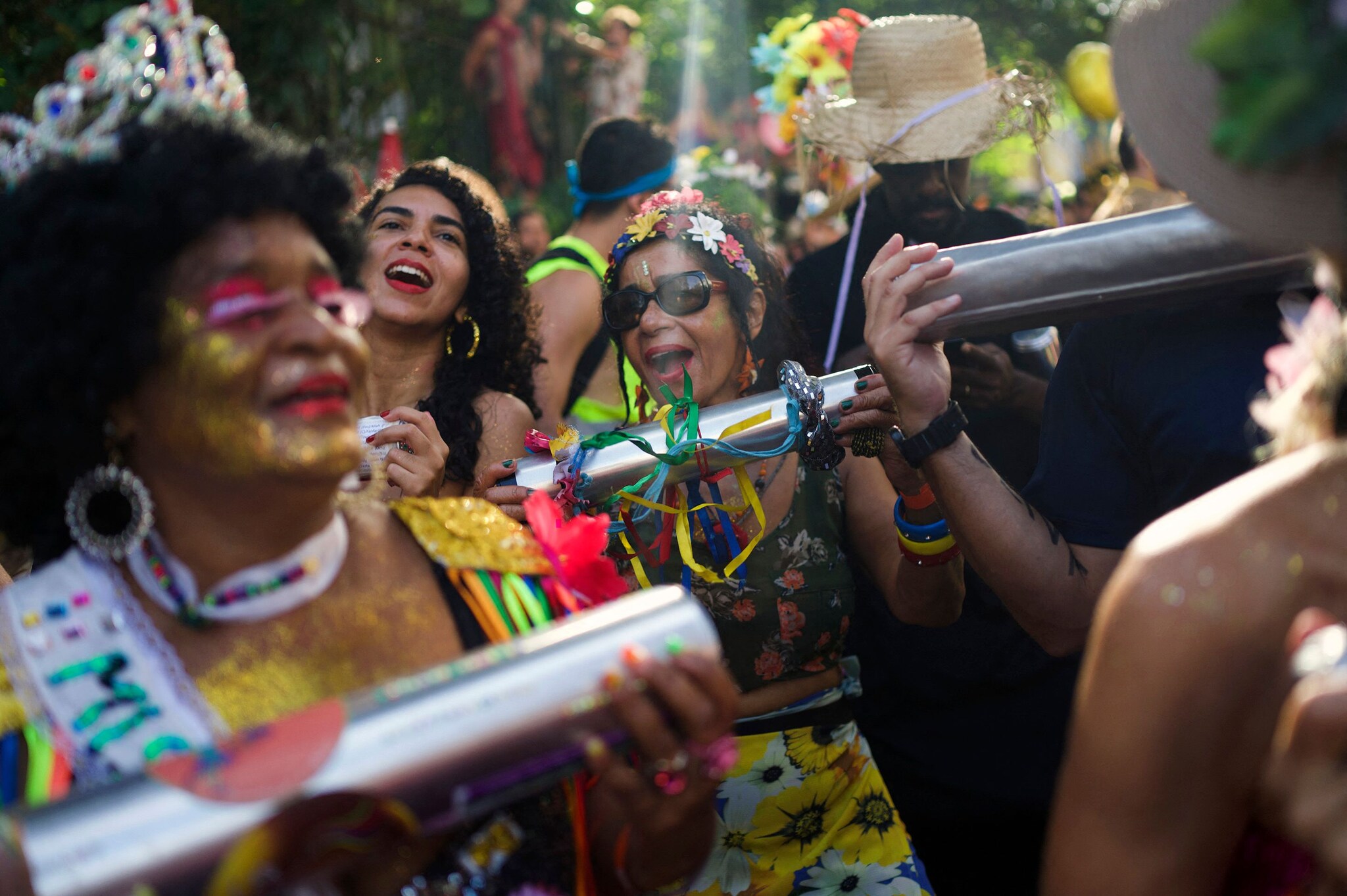
Carnival street parties return to Rio
By AFPRelaxnews | Feb 15, 2023
This year marks the full comeback of the world's biggest carnival after Rio hosted a watered-down version in 2022—postponed by two months because of the pandemic, and held without the epic street parties known as "blocos" that usually swarm the iconic beach city this time of year
 [CAPTION]Revellers of the street carnival group "Ceu Na Terra" (Heaven On Earth) play music and sing during the carnival street parade at Santa Teresa neighborhood in Rio de Janeiro, Brazil, on February 11, 2023.
Image: Mauro Pimentel / AFP©[/CAPTION]
[CAPTION]Revellers of the street carnival group "Ceu Na Terra" (Heaven On Earth) play music and sing during the carnival street parade at Santa Teresa neighborhood in Rio de Janeiro, Brazil, on February 11, 2023.
Image: Mauro Pimentel / AFP©[/CAPTION]
Covered in golden glitter, Brazilian domestic worker Vera Lucia da Silva is bursting to be back parading through Rio de Janeiro in a carnival street party, after a three-year hiatus for Covid-19.
This year marks the full comeback of the world's biggest carnival, after Rio hosted a watered-down version in 2022—postponed by two months because of the pandemic, and held without the epic street parties known as "blocos" that usually swarm the iconic beach city this time of year.
"To people from Rio, street carnival is everything that's good in life," beamed Da Silva, as she paraded through the hillside neighborhood of Santa Teresa in a bloco known as "Ceu na Terra"—Heaven on Earth.
_RSS_It was just after sunrise on a Saturday morning, but the beer was already flowing as revelers bounced to the beats of the bloco's brass band, decked out in sequins, body paint, sparkly hot pants and masks—the costume-ball kind, not the Covid kind.
"Street carnival brings together people from all walks of life—everyone playing, everyone happy," said Da Silva, 58, who plays a traditional percussion instrument known as the "ganza" in the bloco band.
Rio authorized around 400 blocos this year. They have been flooding the streets ahead of the main carnival event: the city's samba school parade competition, scheduled for Sunday and Monday nights.
Many revelers are also celebrating because it is the first carnival since the election loss of ex-president Jair Bolsonaro, a far-right conservative whose critics accuse him of authoritarian tendencies and attacking numerous causes close to the carnival community's heart, from diversity to gay rights to the arts.
Some revelers poked fun at the ex-army captain, whose slogan was "Brazil above all, God above everyone."
"We're for 'carnival atop all, booze inside everyone,'" said 44-year-old teacher Amelia Crespo, who was sporting the Brazilian football team's yellow jersey, a national symbol that Bolsonaro supporters attempted to claim as their own.
"This is a moment of rebirth," said Pericles Monteiro, a founder of Ceu na Terra and conductor of its 200-member band.
"We went through a very dark period, in terms of both politics and the pandemic," he told AFP.
Brazil was one of the hardest-hit countries in the world at the height of the pandemic. Its Covid-19 death toll stands at nearly 700,000—a figure opponents blame on Bolsonaro's unorthodox policies.
"We were feeling suffocated on every level: as a cultural group, as citizens, as people dealing with a health crisis that caused so many deaths," said Monteiro.
Also read: From tomato tossing to playing piggy: Europe's weirder summer festivals
Parties and politics
"Brazil is emerging from a period in which political power was anti-carnival," said Adair Rocha, head of cultural programming at Rio de Janeiro State University."This year's carnival is all about happiness, the re-embrace of democracy, the freedom to celebrate cultural and sexual diversity.... Carnival is all about democratic expression, the celebration of life."
President Luiz Inacio Lula da Silva, the veteran leftist who narrowly beat Bolsonaro in October's elections, is more carnival-friendly.
He met with samba school leaders during the campaign, and may attend the official carnival parades this year, according to media reports.
First Lady Rosangela "Janja" da Silva has already signed up to be "godmother" at the Imperatriz samba school and support its social projects in Rio's slums.
Redemption and hope
There is an optimistic vibe in the air at "Samba City," the sprawling hangars where the samba schools prepare the towering floats and sumptuous costumes for their world-famous shows at the city's "Sambadrome" parade venue."You can feel it: culture is valued again," said Tarcisio Zanon, creative director at the Viradouro samba school.
"This is going to be a carnival of redemption, of hope for a better future."
Rio officials are expecting five million people to take part in street carnival, moving an estimated one billion reais ($190 million) for the local economy.
In the Saara market district, Rio's mecca for sequins, wigs, glittery get-ups and all other things carnival, street vendors and shopkeepers are ready for the comeback.
"People have years of pent-up carnival energy," said vendor Marcelo Rodrigues.
"They're ready to party."